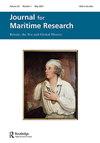A note from the editors
Q3 Arts and Humanities
引用次数: 0
Abstract
Piracy has long been a subject of intense popular interest. The stereotypical and often caricatured image of the pirate abounds across British society, whether in novels, in film or on the stage. This public obsession has frequently obscured scholarly efforts to understand better the lives and motivations of the numerous individuals who turned to criminality at sea. In recent years, however, researchers from a range of backgrounds have re-assessed and often overturned some of the long-standing myths that surround this ever-engaging subject. There is now, for example, a greater appreciation of the differences between corsairs, buccaneers and privateers and the many other seafarers that have been labelled as pirates. The ‘Golden Age of Piracy’ (itself a loaded and problematic term) has been situated in the longer history of maritime violence, from the ancient era through the present day. Similarly, piracy has been appreciated as a truly global activity, limited not just to the Caribbean, but also taking in the Mediterranean, the Baltic and the Indian Ocean (and, of course, Penzance). Pirates are now studied from the land as well as the sea, conforming to a broader trend within maritime history. Scholars now appreciate more fully the communities that produced and sustained piracy, while others have considered their remarkable cultural impact. As a result, our understanding of piracy has become more refined and more sophisticated. Indeed, research continues apace. This special issue of the Journal for Maritime Research presents four articles that shed new light on the subject of piracy, in all its guises. Each article is evidence of the great number of disciplines that now have a stake in these historical debates, including scholars of literature, law, warfare, politics, society and culture. We hope these fresh approaches to the study of piracy and the maritime world more generally will encourage further research into this fascinating topic.编辑的注释
海盗行为长期以来一直是一个引起广泛关注的话题。无论是在小说、电影还是舞台上,海盗的刻板形象和经常被讽刺的形象充斥着英国社会。这种公众的执念常常使学者们无法更好地了解那些在海上从事犯罪活动的无数人的生活和动机。然而,近年来,来自不同背景的研究人员重新评估并推翻了围绕这一始终引人入胜的主题的一些长期存在的神话。例如,现在人们对海盗、海盗和私掠者以及许多其他被贴上海盗标签的海员之间的区别有了更深刻的认识。“海盗的黄金时代”(本身就是一个充满问题的术语)一直处于从古代到现在的更长的海上暴力历史中。同样,海盗行为也被认为是一种真正的全球性活动,不仅局限于加勒比海地区,还包括地中海、波罗的海和印度洋(当然还有彭赞斯)。海盗现在既从陆地上研究,也从海上研究,这符合海运史上更广泛的趋势。学者们现在更充分地认识到产生和维持盗版的社区,而其他人则考虑到他们显著的文化影响。因此,我们对盗版的理解变得更加精细和复杂。事实上,研究仍在快速进行。本期《海事研究杂志》特刊刊登了四篇文章,对各种伪装的海盗问题有了新的认识。每篇文章都是大量学科的证据,这些学科现在与这些历史辩论有利害关系,包括文学、法律、战争、政治、社会和文化方面的学者。我们希望这些研究海盗和海洋世界的新方法能够鼓励对这个迷人话题的进一步研究。
本文章由计算机程序翻译,如有差异,请以英文原文为准。
求助全文
约1分钟内获得全文
求助全文
来源期刊

Journal for Maritime Research
Arts and Humanities-History
自引率
0.00%
发文量
0
期刊介绍:
The Journal for Maritime Research ( JMR ), established by the National Maritime Museum in 1999, focuses on historical enquiry at the intersections of maritime, British and global history. It champions a wide spectrum of innovative research on the maritime past. While the Journal has a particular focus on the British experience, it positions this within broad oceanic and international contexts, encouraging comparative perspectives and interdisciplinary approaches. The journal publishes research essays and reviews around 15-20 new books each year across a broad spectrum of maritime history. All research articles published in this journal undergo rigorous peer review, involving initial editor screening and independent assessment, normally by two anonymous referees.
 求助内容:
求助内容: 应助结果提醒方式:
应助结果提醒方式:


